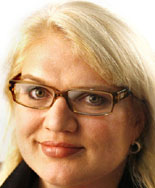
The widower who learned to braid his daughter's hair. The father who takes a shift changing his grown son's colostomy bag.
The mother who looks at her granddaughter's face and knows it's the closest she'll ever come to seeing her son again.
These relatives of U.S. soldiers who were injured or killed in Afghanistan are trying to shut down the worst questions that keep banging around in their heads right now:
"Was it worth it?"
"Did they die in vain?"
"What was the sacrifice for?"
Arlene Wagner is working hard to not go there.
"It's like December 21, 2015, all over again," said Wagner, remembering the day her son, Air Force Staff Sgt. Peter Taub, was killed in an explosion near Bagram air base in Afghanistan.
"Pete was killed with five others," said Wagner, 70, whose popular sandwich shop in Dupont Circle is decorated with tributes to her son. "I think about the men and women alongside of him, how many losses their families suffered, how are they dealing with this."
And there's silence on the phone. She's holding back the emotions that are coming on so fierce and raw again. The grief hasn't gone. It's there every day. But after five years, she's worked to manage it - and seeing those images of desperate, frightened people trying to flee Kabul brought it all back.
"I miss my son," she said, between quiet gulps. "And I think I may need to give my grief counselor a call again."
She wasn't holding out for the glorious return of democracy to Afghanistan as the thing that would give meaning to her son's death and those of the 2,447 other American service members killed there.
No, anyone who knows about the deep, war-torn history of that country knew America's involvement in Afghanistan wasn't going to have a fairy-tale ending. Wagner had to make peace with the idea that her son died doing what he loved.
"When Pete joined the military, he knew what he signed up for. He knew the risks. I hate that he went. I hate, hate that he went," she said. "But he was doing what he wanted to."
Families of those killed or injured will always struggle with the price of war, especially when they foot that bill every day. And this war - Afghanistan, and Iraq, too - is different in the way it exacts its toll, extracting its terrible price for years.
"In World War I and World War II if you were severely injured, you most likely died on the battlefield," said Bonnie Carroll, a veteran who founded the Tragedy Assistance Program for Survivors (TAPS), after her husband was killed in a military plane crash.
"The wars that followed 9/11 have seen many of our loved ones bringing the war home with them and dying from suicide as a result of post-traumatic stress or illness as a result of exposures," she said.
Advances in battlefield medicine saved more lives but have sent more than 20,000 veterans home with catastrophic injuries, requiring an army of hundreds of thousands of caregivers and millions of dollars in medical costs.
The TAPS outreach lines were flooded over the weekend, as news of the Taliban sweep spread.
One message, from a widow reckoning with her husband's death, stood out to Carroll:
"Does Afghanistan have a struggle in front of them? Undoubtedly so. Will I, my children, and the TAPS family continue to miss our loved ones? Unequivocally, yes," she wrote to the group.
They knew it was a quagmire, a land battle-scarred for centuries.
"I've interviewed hundreds of soldiers, they all saw the futility of what was happening," said Carl Castro, a professor at the University of Southern California's social work school and a military veteran who studies veterans' mental health and their stunning suicide rate, which began to rise last year, according to a Defense Department report.
"There was no progress being made, they had to do armed convoys for trash collectors," Castro said. "We were all asking this when we got there. Especially by the second rotation: 'Why are we here?' "
The veterans he talked to had to find solace - not in whether their mission in Afghanistan was successful but in the bonds they formed with their units and their own growth as humans from the experience - if they wanted to stay sane.
And that's not easy. The fall of Kabul, which unfolded in a matter of days, can be a triggering event for veterans struggling with mental health.
"It could reintroduce the pointlessness of all of this: Why did we do all of this? Why did we do it so long?" Castro said.
But there are small moments that veterans must remember, said Rob Willigern, 48, who was an Army medic in Afghanistan.
"There are individual lives over there that we did impact," Willigern said, remembering the many Afghan children whose burns from open-cooking fires he had treated, the child they were able to save after a bomb explosion, the older man who thanked him for being in the country. "Some people who felt safety for a time that they never had. Who got medical care they would never receive. We did our jobs and did it well."
Carroll sent a message to all the TAPS families with the a similar theme.
"The last 24 hours have been heartbreaking as we have watched the situation in Afghanistan unfold. We understand this time can bring feelings of hurt, angst, anger, and confusion. You are not alone. Your TAPS Family is here no matter where you are on this journey.
"The true lessons of war are not in what our warriors died for but for what, and for whom, they lived. And it is our sincere hope you will allow us to walk beside you, help bear the burden you may be feeling, and remember your loved one with you."
(COMMENT, BELOW)
Previously:
• A shifting economy has gotten a helicopter generation of teens to embrace work. Just in time
• This fighter pilot and working mom saw a UFO. For real
• Evil geniuses of the People!? Cyberattacks against big corporations hurt the little guy the most
• Trump Plaza was blown up in Atlantic City, and D.C.'s 1st Amendment display is in pieces
• Back to class might not mean back to socializing
• Does the pandemic mean the end of snow days, too?
• To get votes, families are cutting deals
• A nation less divided than it seems
• Vacation shaming travels far and fast
• Meet the 16 year-old who created Bird Bot, which is disrupting a global market
• The woman behind Roe v. Wade reveals in soon to be aired documentary she was a fraud --- others will probably call her much worse
• The weekend when we all had enough and went back outside
• The streets are empty, but Home Depot isn't
• 'Animal Crossing' is 'Fortnite' for moms. The video game couldn't have come at a better time
• 'This can't be the end:' How small gestures can help small businesses in a big way
• Will coronavirus intimacy lead to a baby boom? Or a divorce tsunami?
• This scammer called the wrong guy asking for money
• High schools are starting to bet on esports --- to engage and motivate
• Washington's Worst civic idea ever? Giving regular people power to issue parking tickets
• Washington's city of strivers, and the places they sob
• Do all those kids really like eggs? Or do they just like fame?
• Trump and the 25th Amendment: Why it was written and what it can't do
• The IRS seized $59,000 from a gas station owner. They still refuse to give it back
• Breast-feeding case is a win for fathers, formula
• Nazis flags in Charlottesville were an affront to WWII veterans. And they fought back
• A 13-year-old's online fantasies turn fatal


 Contact The Editor
Contact The Editor
 Articles By This Author
Articles By This Author